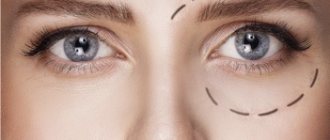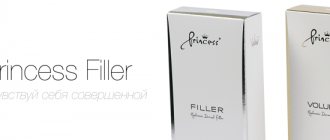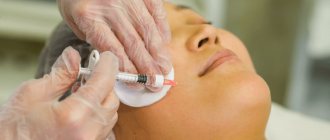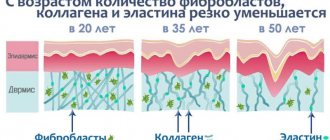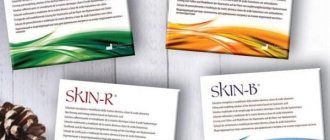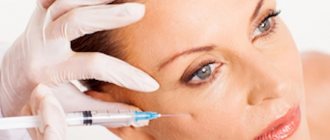The bioreparation procedure is the latest development in the field of injection cosmetology, which can give our skin a second youth.
Indications for the bioreparation procedure:
- Dry skin, increased sensitivity
- Age-related changes: pronounced expression lines, medium and deep wrinkles, ptosis
- Photoaging: dry skin and hyperpigmentation
- Spider veins on the face, rosacea
- Decreased skin tone and elasticity
- Acne, acne scars and stubborn acne spots
- Scars.
- The process of skin rehabilitation after aggressive rejuvenation techniques (use of laser, burns after various procedures)
- Flabbiness of the skin of the hands, age spots
Mechanism of action of bioreparation
Connective tissues are responsible for the smoothness and elasticity of our skin: collagen and elastin. The gaps between the fibers are filled with hyaluronic acid. As much as we would like, over time, collagen and elastin fibers become less and less or their structure is disrupted. Plus the amount of hyaluronic acid decreases. The result is that wrinkles appear on the skin, it becomes flabby and uneven.
The bioreparation procedure made it possible to restore the required volume of hyaluronic acid and, moreover, to launch the natural processes of internal regeneration of the skin. Even one session will please you with an improvement in the appearance of your skin.
During bioreparation, preparations containing hyaluronic acid, vitamins, and amino acids are administered using microinjections. The procedure triggers natural regeneration processes that continue to work for quite a long time.
Make an appointment
Indications for the procedure
Injections of bioremedies are indicated when a cosmetologist identifies the first expression lines or other skin imperfections in the face, eyes or neck. Typically, such age-related changes are observed after 25-30 years. It is this age that is often recommended for the first preventive facial bioreparation session. There are no maximum age-related contraindications for the procedure.
Among the indications for facial bioreparation using preparations based on hyaluronic acid:
- sagging skin, loss of elasticity;
- rosacea;
- dryness of the skin, which cannot be eliminated for a long time even with the help of a moisturizer;
- acne and acne;
- the presence of scars, scars or other unaesthetic defects;
- loss of clarity of facial contour;
- pigment spots on the skin;
- any age-related changes in the skin.
Biorevitalization and bioreparation - what is the difference?
Bioreparation is the next, more innovative step after biorevitalization. But they both deserve the right to exist. Both procedures are similar in the technique of execution - these are microinjections of certain drugs subcutaneously. The key difference is the composition of the administered agents and, accordingly, their action and effect.
Biorevitalizants contain hyaluronic acid (it is also possible to add antioxidants), which can be in a stabilized or unstabilized state. Such drugs remain in the dermis for a maximum of 72 hours.
Biological agents are complex preparations based on the same hyaluronic acid. A significant addition to these products are peptides, vitamin complexes, and amino acids. Thanks to this multicomponent nature and special molecular structure, bioreparation preparations can remain in the skin for up to 3 weeks, creating a supply of nutrients and stimulating the synthesis of new collagen fibers. Additionally, protective properties are increased and regeneration processes are activated.
What to choose - bioreparation or biorevitalization?
Fortunately, in this case the choice is not so difficult to make. It all depends on your final goal. If you want to get a long-term effect, but you don’t have time to visit the clinic frequently, bioreparation is your choice. For those who decide for the first time to undergo intradermal injection of hyaluronic acid, it is better to focus on biorevitalization.
Make an appointment
Possible contraindications
Facial bioreparation, like any other cosmetic procedure, has a number of contraindications. They are absolute and relative. And if in the presence of the former the procedure is strictly prohibited, then in the latter the decision on the advisability of carrying it out is made by the doctor. Among the obvious contraindications:
- period of pregnancy and lactation;
- individual intolerance to one or several components of the drug;
- foci of inflammatory diseases in the place where the drug should be administered;
- previously diagnosed cancer;
- diseases or pathologies of the body caused by blood clotting disorders;
- regular use of drugs with anticoagulant properties, which were prescribed by the attending physician.
Stages of bioreparation
Preparation
The drug is injected into the dermal layer using injections. To make the injections as painless as possible, an anesthetic cream or gel is applied to the problem area before starting the procedure.
Injections
The face, neck, and décolleté are treated using the “papule” technology. The needle is inserted into the tissue with the cut up and at a minimal angle, the drug is injected until a papule measuring 1-2 mm is formed (in the eye area - no more than 1 mm).
Peculiarities
For the face, injections are made along massage lines at a distance of 1 cm. The neck is treated in parallel along arched lines, the distance between punctures is 1.5 cm. The décolleté area is injected in “steps” of 2 cm.
Completion
Treatment of the affected area with a special cream, which has a calming effect and enhances regeneration.
Recommendations after the bioreparation procedure
Puncture marks disappear within a day. To make the effect of the procedure more pronounced and last as long as possible, the cosmetologist will recommend cosmetics that have a lymphatic drainage and lipolytic effect.
To achieve the maximum effect from bioreparation, you must complete a course consisting of 3 sessions (once every 3 weeks). Also, as a rule, a maintenance procedure is performed - once every 2 months.
Recovery period
The procedure has no pronounced side effects. But in the first 24 hours after facial bioreparation, small red papules may form at the injection site. They should not be squeezed or combed, they will quickly dissolve and they do not require any special treatment. In addition to papules, temporary swelling, mild itching or redness are sometimes observed. This is a normal reaction of the body.
To reduce the duration of the rehabilitation period, you should strictly adhere to the recommendations of the cosmetologist. The first week after facial bioreparation using preparations based on hyaluronic acid is prohibited:
- visit public swimming pools, baths, saunas;
- train hard in the gym;
- If you stay in the open sun for a long time, be sure to use a UV-protecting cream before going outside.
All these measures will help avoid unwanted pigmentation after the procedure.
Our doctors
Apchel A.V. Doctor of Medical Sciences, Head of the Cosmetology Department. Cosmetologist, dermatologist, plastic surgeon
Panchulidze T. T. Cosmetologist, dermatologist
Gerberg A.E. Body esthetician, massage therapist.
Andrievskaya M. V. Master of nail service, manicure, pedicure, podiatrist
Sign up
Prices for biorevitalization:
| Service | Price | |
Biorevitalization with hyaluronic acid | ||
| Hyaluform 1% – 1.5 ml | 6000rub | |
| Hyaluform 1.8% – 1.5 ml | 7000rub | |
| Hyaluform 2.5% – 2 ml | 9500rub | |
| Profhilo 3.2% – 2 ml | 17000rub | |
Bioreparation | ||
| Aquashine HA 2 ml | 11200rub | |
| Aquashine HA BR 2 ml | 11200rub | |
| Meso-Wharton P199 (Meso-Wharton P199) 1.5 ml | 12000r / 10200p* | |
| Meso-Xanthin F199 (Meso-Xanthin F199) 1.5 ml | 12000r / 10200p* | |
| Meso-Sculpt C71 (Meso Sculpt C71) 1.0 ml | 12000r / 10200p* | |
| Meso-Eye C71 (Meso-Ay C71) 1.0 ml | 12000r / 10200p* | |
| Novacutan YBio 2.0 ml | 12900rub | |
| Novacutan SBio 2.0 ml | 12900rub | |
| Gialripaer "02" 1.5 ml (on order) | 8500rub | |
| Gialripaer "08" 1.5 ml (on order) | 8500rub | |
Biorevitalization with polynucleotides (PDRN) | ||
| Plinest, 2 ml | 12000rub | |
| Plinest Fast, 2 ml | 12000rub | |
Anesthesia | ||
| Cream "Akriol Pro" | 500r | |
* 10,200 rub. instead of 12,000 rubles. drugs: MESO-WHARTON P199, MESO-XANTHIN F199, MESO-SCULPT C71, MESO-EYE C71
You can make an appointment or get a consultation by phone or via instant messengers.
+7
How long does the effect last?
The effect of increasing elasticity and reducing skin dryness is noticeable after the first or second procedure, intensifying after a full course of procedures. Depending on the individual genetic characteristics of the patients, the effect of the course of procedures lasts from 6 to 12 months. Sometimes, with prolonged exposure to the sun and intense tanning, additional procedures are required to maintain the effect. Supportive procedures are carried out 1-2 weeks before a trip to the sea or a week after returning.
What do biorevitalizers have in common?
The main component in all preparations is hyaluronic acid. This substance may be unstabilized or stabilized. The first variety is capable of deeply moisturizing the skin, attracting and retaining water molecules. The second is intended for contour plastic surgery. It is used when it is necessary to fill nasolabial folds or increase the volume of the lips. The stabilized substance provides a long-lasting effect and can maintain volume for a long time, making the face much younger.
Progress of the procedure
The procedure Biorevitalization (bioreparation) of the face takes 10-15 minutes. Most drugs are administered through multiple injections, spaced about a centimeter apart. After this procedure, bumps (papules) remain on the skin, which last for about two days. Some drugs are administered using the bolus technique. Injections are not carried out over the entire surface of the skin, but at several specific points. After this, no bumps remain on the skin. This technique helps strengthen the ligaments and helps maintain the oval of the face. A combination of papular and bolus techniques is possible both during the course of procedures and during one procedure.
There is little or no pain during the procedure. The injection of different drugs feels different. Therefore, it is advisable for patients with hypersensitivity to warn their doctor about this so that they can choose a drug that does not cause pain.
How do drugs from different manufacturers differ?
Biorevitalizers today are produced by many companies from different countries. If we talk about the most popular, these are the drugs from the following manufacturers:
- Juviderm,
- Teosyal,
- Revy
- YVOIRE.
Before you give preference to a specific one, you should understand what is the difference between one biorevitalizer and another. All injection preparations used in modern cosmetology differ from each other in the following:
- quantitative content and type of hyaluronic acid;
- the presence and composition of additional components;
- cost.
It is important that the choice in favor of a specific drug is made by an experienced cosmetologist who can choose the most effective one for each skin type in accordance with age and condition.
Many people mistakenly believe that the higher the hyaluronic acid content, the more effective the injections will be. This statement is not only erroneous, but also dangerous. If you use 2% or more concentrated preparations for thin skin, this will lead to swelling and stretching of the tissue due to overcrowding with moisture. With such skin, it is much more effective to undergo a course of several procedures using a less concentrated drug, which will not only avoid complications, but will also provide a more lasting result due to the cumulative effect in the tissues.
2% preparations are intended for rejuvenation of the décolleté area. If the concentration is higher, then hyaluronic acid is introduced together with amino acids, which are necessary for its better absorption by tissues. This procedure is called biooperation and provides not just deep hydration, but also initiates effective cell regeneration.
Contraindications to the use of the method
Despite the fact that bioreparation is a safe rejuvenation method, it still has no contraindications. Injections are not prescribed to patients diagnosed with the following pathologies:
- acute infectious diseases accompanied by high temperature, fever;
- benign and malignant tumors;
- diseases of the hematopoietic system;
- autoimmune pathologies;
- mental disorders;
- congenital or acquired immunodeficiency;
- herpes in the active stage;
- exacerbation of chronic diseases;
- inflammatory, purulent foci at the injection site;
- cardiac, renal, liver, pulmonary failure;
- hormonal, endocrine disorders.
Bioreparation is contraindicated for women during pregnancy, breastfeeding, and menstrual bleeding. Also, the procedure is not prescribed to patients with intolerance to the components included in the bioremedies.

